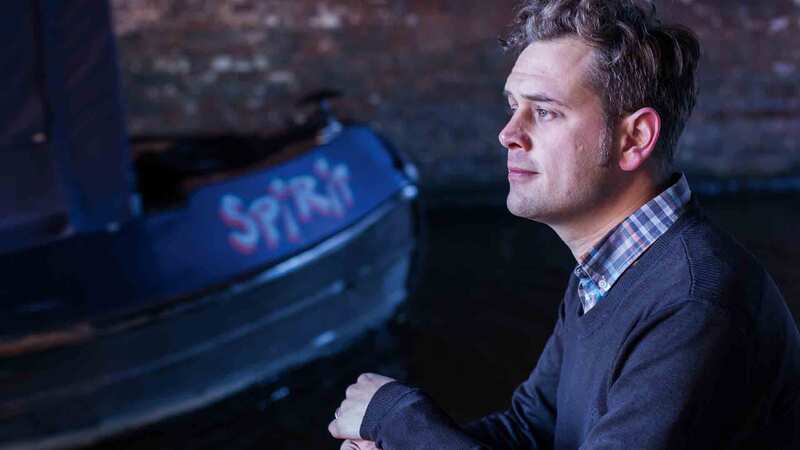You are viewing your 1 free article this month. Login to read more articles.
John Sam Jones | 'Without stories, people are clothed in silence'
Caroline Sanderson talks to John Sam Jones, one of Wales’ best-known gay writers and activists, about his memoir The Journey is Home: Notes From a Life on the Edge.
"I didn’t want to be a homosexual. I didn’t want to be bullied and ridiculed for the rest of my life. I was 18 years old and crippled by the shame of it.”
In a disturbing episode related in his resonant and compelling memoir The Journey is Home: Notes From a Life on the Edge, John Sam Jones, one of Wales’ best-known gay writers and activists, describes undergoing the Electric Shock Aversion Therapy (ESAT) offered to him as a “cure” for his homosexuality in 1975. Naked from the waist down, he is shown gay pornography, “the like of which I’d never seen, and if my penis so much as twitched, began to swell, or became erect, I was shocked”. This treatment continued for weeks, and left him traumatised for years. (As I write this almost half a century later, legislation has just been announced to ban such conversion practices.)
Happily, Jones, now in his mid-sixties, has been in a relationship with his German husband Jupp for almost 35 years and The Journey is Home contains a wealth of stories from his eventful, well-travelled life. We learn of his closeted working-class boyhood in North Wales, where his family has resided for more than 300 years; his confused university years in Aberystwyth; his time as a graduate student in 1980s San Francisco, as the AIDS epidemic took hold; and his return to the UK, where he worked in education and public health, chaired Stonewall Cymru, and latterly ran a top-rated seaside B&B with his husband. It’s a remarkable journey, characterised by a quest for honesty, integrity and authenticity, and for healing.
Publication of The Journey is Home—also coming from Parthian in a Welsh-language edition, Y Daith Ydi Adra, translated by Sian Northey, and on audiobook—will be followed in July by Kiss and Tell, a selection of Jones’ short stories. He is also the author of two novels, With Angels and Furies and Crawling Through Thorns. When we speak via Zoom, I ask why he decided to write a memoir.
“Because Richard Davies at Parthian kept badgering me to write one! Crawling Through Thorns, which he published in 2008, is partly autobiographical: the main character undergoes ESAT. But you don’t get any sense of how he was rehabilitated, so Richard was interested to know how I rebuilt my own life. Since writing that novel, my mother had had dementia, and with her memory loss, I found the experience of never being certain of who I was with her really hard. It was only when she died that I started to think about writing again, partly to reflect on that.”
In The Journey is Home, Jones—who is fluent in Welsh and English, though his “gift for writing is only in English”—movingly describes how his ailing mother, with whom he had always spoken Welsh, began speaking to him in English, her failing memory mistaking him for someone from another part of her life when she was in service and required to speak English. It leads to fascinating reflections on language, and how it “defines so much about who we understand ourselves to be”. The Journey is Home is also a powerful testament to finding one’s voice, and how writing about one’s experiences can help and support others. Still, Jones remains somewhat astonished that he is a published writer. “I didn’t read a novel until I was 16. Back then, literature was the kind of thing that poncy people did. But suddenly I realised I could string sentences together and actually write about my experiences in ways that touched other people’s lives”. Jones credits an inspirational English teacher, Miss Enid Jones, as instrumental in his journey to becoming a writer. Interestingly she also taught Philip Pullman, and he too has written in warm tribute to her.
As he relates in his book, Jones, who studied theology in the US, and worked as a lay minister both there and once back home in the UK, contemplated being ordained. Given the church’s stance on gay clergy, however, he refused to take that step on the grounds that he would have to hide his sexuality. But he was struck by the words of one of his theology professors in the US, who told him: “You’re not likely ever to be ordained because you’re too out. But you must think about writing as your ministry.” Jones is no longer a regular churchgoer, but his sense of vocation, as one of the first Welsh writers to portray gay lives in fiction, remains fervent. “Without stories, people are clothed in silence,” he writes.
Going to Germany
Following the Brexit vote of 2016, and alarmed at growing xeno- phobia in their small community, Jones and his husband relocated from North Wales to the flatlands of Jupp’s native Germany, close to the Netherlands border. “My immigrant husband was uncomfortable for the first time in 30 years, and I was uncomfortable because I didn’t want him to be. So we left.” Now Jones is learning a third language, German, and is once more the EU citizen he passionately desires to be—although he says he is sometimes homesick for the Welsh mountains.
Despite the latest relocation and personal transition in his eventful life, Jones’ sense of purpose in writing The Journey is Home is clear. “I’m trying to be a witness to what has happened in my lifetime. In some respects the role of being a witness doesn’t depend on being heard. But you still have to be that witness”.
The Journey is Home was published by Parthian on 1st May (hardback, £15, 9781912681747; audio, £7.99, 9781912681747; e-book, £7.99, 9781912681952).
You can read more content from the Wales Country Focus here.









